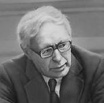Person of day - 17 AUGUST 2023
MIKHAIL BOTVINNIK

The stages of Botvinnik’s blistering chess career are well known. In 1925, the 14 year-old beat Capablanca in a session of simultaneous chess and two years later, he made his debut in the Soviet championship, where he split 5th-6thplaces and became a master. Four years later, he became the champion of the USSR- the first of his seven victories. For the next thirty years, Botvinnik was the undisputed leader of Soviet chess.
In the mid-1930, Botvinnik entered the global chess elite. He split 1stplace with Flohr at an international tournament in Moscow in 1935, where he overtook Capablanca and Lasker. One year later, he won a grand tournament with the great Cuban in Nottingham, where all the world’s finest chess players came together, including the incumbent world champion Euwe and three former world champions Lasker, Capablanca and Alekhine. The success of the 25-year-old chess player was greeted with euphoria at home; he received a prize car from People’s Commissar Ordzhonikidze,and Pravda devoted a prime article to him. Botvinnik was given a lavish welcome in Moscow, where he was treated like a star. He became a national hero and an example to others alongside people like Valery Chkalov, Alexey Stahanov and Pavel Angelin…
At the famous AVRO tournament in 1938, he came third and defeated Capablanca and Alekhine in beautiful matches. This gave him the right to talk to Alekhine about a match for the world championship. The two men reached an agreement and Alekhine was ready to play, but the match was not to be; first, War broke out and then Alekhine died suddenly.
1948. Five of the world’s strongest chess players fight for the crown in a match-tournament. Botvinnik decisively won each match and, overtaking second-placed Smyslov by 3 points (!), he became the sixth world champion. He would hold this title for 13 years, in which he played 6 matches. He could find solutions in difficult situations and learn lessons from defeats like no one else. After losing to Smyslov in 1957, he retained the crown the next year after thrashing his fearsome opponent. After he lost to a rising Tal in 1960, he avenged himself a year later with a score of 13:8! It was only his defeat to Petrosian in 1963 that finished his 30-year reign in chess, since revenge matches were cancelled. But even after he stopped being world champion, Botvinnik continued to play in tournaments, demonstrating, as ever, far-reaching strategies, comprehensive debuts, fine-tuned endgames and tactical mastery.
Years later, Tigran Petrosian remembered that he found it more difficult to play against Botvinnik than against Fischer. “I was constantly aware of an unpleasant feeling of inevitability. In a conversation with Keres, I told him about this and compared Botvinnik to a bulldozer who crushes everything in its path. Keres smiled and said: “Imagine what it was like for us to play against him when he was young.” Bronstein talked about Botvinnik in similar terms: “He played like a bulldozer: marching through the centre, he gave his opponents no chance of surviving his determination and energy. No one could cope with the precision of his play- it was as if he wasn’t playing with piecesas much as banging nails into the wall!”
Botvinnik was the de-facto author of the system that determined the world champion. It was he who transferred that title onto FIDE with the support of the Soviet chess federation- before Botvinnik, the title was carried by an individual rather than the organisation. The system that was designed by the sixth world champion survived until the mid-1990s and died with its creator.
For many years Botvinnik governed a chess school which trained Karpov, Kasparov, Kramnik, Balashov, Razuvaev, Jussupow, Sokolov, Akhmylovskaya, Ioseliani and other celebrated chess players. Botvinnik devised his own method of preparing for tournaments and training, and he conferred it onto his mentees. As a doctor of technical science, he made an enormous contribution to devising programs for chess computers.
“Without a shadow of doubt, Botvinnik viewed chess through a classical perspective. He was a worthy successor to his great predecessors- Lasker, Capablanca and Alekhine. His game carried a clear strategy. He was an explorer at heart and his approach was based on his search for the foundation of chess.” These words, said by Vasily Smyslov, constitute the best description of Botvinnik the chess player. Yes, he searched for the truth at the chess board, and he often found it.
Until his final days, Mikhail Botvinnik worked at a chess club, which carries his name today, on Gogolevsky Boulevard. The patriarch of Russian chess died in Moscow on 5thMay 1995.
Anatoly Karpov, the 12thworld champion:
“I met Mikhail in 1962 at a gathering of the Labour Club in Podolsk, where he was giving a lecture. But I got to know Botvinnik later, when I began to study at his chess school with six other young players. He was reticent- he spoke calmly and thoughtfully and he often corrected his glasses with one finger. His lessons were more like lectures.
“It was clear that Botvinnik’s pre-war successes and his conquest of the world championship were seismic events, especially the latter. Botvinnik’s coronation took place on Victory Day in the Great Hall at the House of the Unions, and it was an event that celebrated not only sporting and chess successes, but it was a moment of national celebration and euphoria. Botvinnik himself gave a lot to chess, especially in organisation: thanks to him and FIDE’s Swedish president Folke Rogard, there emerged a long-lasting system for deciding the world champion”.
Garry Kasparov, the 13thworld champion:
“Great things are only visible at a distance…” Botvinnik was a man of fixed principles who had his own view on everything that was set and fixed forever. It was futile to argue with him about anything, especially politics, but in chess he steadfastly defended the interests of classical chess. He essentially became a synonym for them. In an ironic twist of fate, the computers that the 6thworld champion so espoused would soon change the game. Chess became quicker and more dynamic. But a rapid and blitz in a match for the world championship!? Botvinnik would never agree to that. And now, when FIDE’s plans to “modernise” the game threaten to destroy their historical status as the pinnacle of intellectual games, it is each chess player’s duty to defend the heritage of the patriarch.
Vladimir Kramnik, the 14thworld champion:
“I first met Botvinnik in the Botvinnik-Kasparov chess school in 1987. That journey to Druskininkai remains very memorable for me. I only came to the school thanks to the director of the post-officein Tuapse, who called Botvinnik and told him about me. Mikhail Moiseevich asked me to send him my games. And so I entered the world of chess.
Botvinnik helped me however he could: for example, he got me invitations to a few important juniors’ tournaments through his reputation. Many speak of his difficult character, but he was always warm, friendly and humorous with us. Overall, Botvinnik is a very positive figure and his main achievement was the creation of the Soviet School of Chess, which subsequently conquered all before it.






















